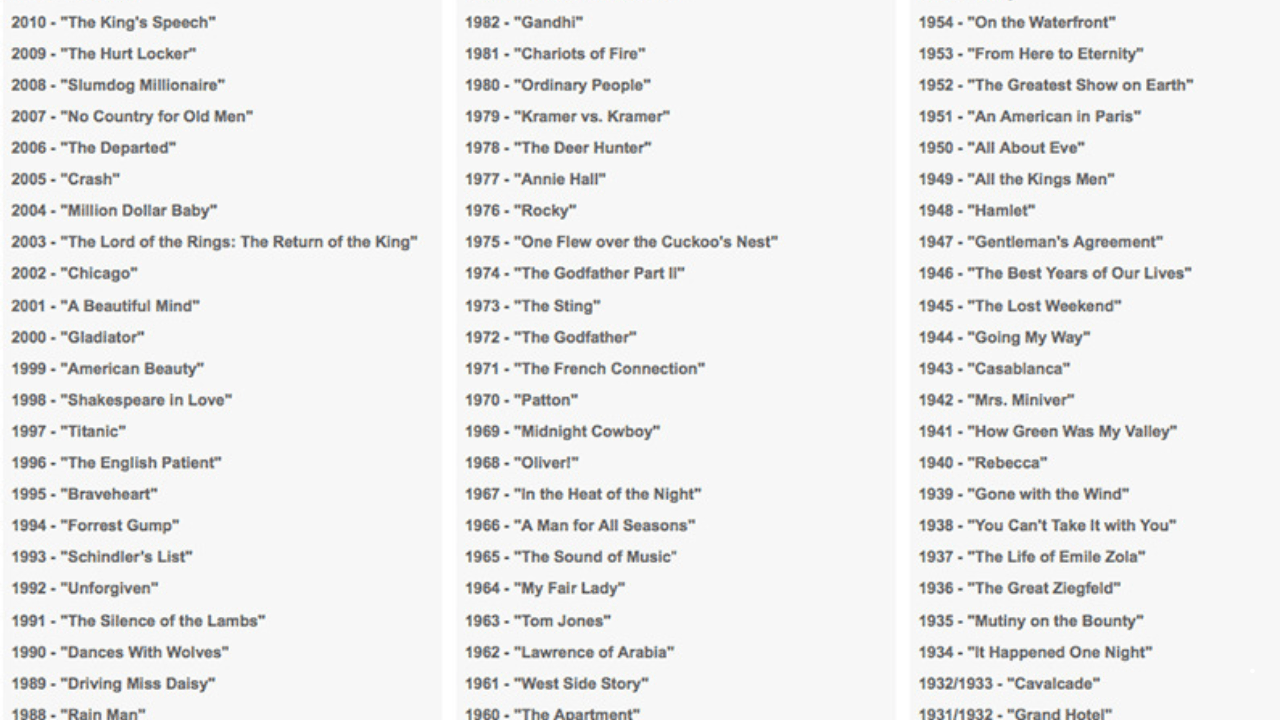The Academy Awards, or Oscars, celebrate the best in cinema each year. These awards honor films that have left a lasting impression on audiences and critics alike. From epic dramas to groundbreaking animations, the Oscar winning movies list by year offers a glimpse into the evolution of storytelling on the big screen.
In this blog, we’ll take you on a cinematic journey through the years, highlighting the films that have won the prestigious Best Picture award. Each year brings new themes, innovations, and unforgettable stories that define the magic of movies.
1920s: The Beginnings of the Oscars
The Oscars began in 1929, with a simple ceremony held at the Hollywood Roosevelt Hotel. The first-ever Best Picture winner was Wings (1927), a silent film about World War I aviators. This marked the start of a tradition that has continued for nearly a century.
Notable Winners of the 1920s
- 1927/1928: Wings
- 1928/1929: The Broadway Melody
These early winners laid the foundation for the Academy Awards, showcasing the artistry of silent and early sound films.
1930s: The Golden Age of Hollywood
The 1930s saw Hollywood’s transition into talkies and the rise of iconic stars. Films like Gone with the Wind and It Happened One Night defined this era of glamour and innovation.
Notable Winners of the 1930s
- 1934: It Happened One Night (the first film to win the “Big Five” Oscars)
- 1939: Gone with the Wind (a sweeping epic set during the Civil War)
These movies set benchmarks for storytelling and production, making the 1930s a pivotal decade in cinema.
1940s: Wartime Stories and Triumph
During World War II, films became a source of hope and resilience. Post-war, the Academy honored movies that reflected humanity’s strength, such as Casablanca (1943) and The Best Years of Our Lives (1946).
Notable Winners of the 1940s
- 1943: Casablanca
- 1946: The Best Years of Our Lives
These films showcased the emotional and societal impacts of war, resonating deeply with audiences.
1950s: Technicolor and Epic Productions
The 1950s brought Technicolor and widescreen formats, revolutionizing the visual experience. Films like Ben-Hur and On the Waterfront showcased larger-than-life storytelling.
Notable Winners of the 1950s
- 1954: On the Waterfront
- 1959: Ben-Hur
This decade highlighted the grandeur and artistry of cinema, with epics and personal dramas taking center stage.
The 1960s was a transformative decade, both socially and cinematically. Films like West Side Story (1961) and In the Heat of the Night (1967) reflected evolving cultural attitudes.
Notable Winners of the 1960s
- 1961: West Side Story
- 1967: In the Heat of the Night
These films broke barriers, addressing topics like race, love, and societal change.
1970s: The Rise of the Blockbuster
The 1970s saw the emergence of iconic directors and the birth of the blockbuster. Films like The Godfather (1972) and Rocky (1976) captured hearts worldwide.
Notable Winners of the 1970s
- 1972: The Godfather
- 1976: Rocky
This decade redefined cinematic storytelling, blending artistry with commercial appeal.
1980s: Diverse Narratives and Universal Themes
The 1980s brought diverse stories to the forefront. From historical dramas like Amadeus to heartwarming tales like Rain Man, this decade celebrated humanity’s complexity.
Notable Winners of the 1980s
- 1984: Amadeus
- 1988: Rain Man
These films balanced grandeur with intimacy, leaving lasting impressions on audiences.
1990s: Modern Classics
The 1990s produced some of the most beloved films in Oscar history, including Titanic (1997) and Forrest Gump (1994). These movies combined emotional depth with visual innovation.
Notable Winners of the 1990s
- 1994: Forrest Gump
- 1997: Titanic
These films continue to be celebrated for their storytelling and technical achievements.
2000s: The Digital Revolution
The 2000s marked a shift towards digital filmmaking and groundbreaking visual effects. Films like The Lord of the Rings: The Return of the King (2003) and Slumdog Millionaire (2008) dominated the awards.
Notable Winners of the 2000s
- 2003: The Lord of the Rings: The Return of the King
- 2008: Slumdog Millionaire
These movies redefined cinematic possibilities, blending tradition with innovation.
2010s: A Decade of Representation
The 2010s saw increased diversity in Oscar-winning films. Moonlight (2016) and The Shape of Water (2017) broke barriers, showcasing unique perspectives and voices.
Notable Winners of the 2010s
- 2016: Moonlight
- 2017: The Shape of Water
These films highlighted the importance of representation and storytelling.
2020s: Bold Choices and Modern Themes
The 2020s have started with bold and diverse Oscar winners, reflecting a global perspective. Films like Nomadland (2020) and CODA (2021) focus on intimate, human stories.
Notable Winners of the 2020s
- 2020: Nomadland
- 2021: CODA
These films capture the spirit of the times, emphasizing resilience and connection.
Why the Oscar Winning Movies List by Year Matters
The Oscar winning movies list by year is more than just a catalog of films. It’s a reflection of cultural shifts, technological advancements, and storytelling excellence. Each winner holds a mirror to its era, capturing the values, struggles, and triumphs of the time.
Final Thoughts on the Oscar Winning Movies List by Year Wise
Exploring the Oscar winning movies list by year wise is a journey through the history of cinema. These films remind us of the power of storytelling to inspire, challenge, and unite us. From the golden age of Hollywood to the digital era, these movies represent the pinnacle of artistic achievement.
Whether you’re revisiting classics or discovering new favorites, the magic of these films will continue to shine for generations to come.
Related Articles:
For further reading, explore these related articles:
- Enrique Iglesias Latest Songs: A Dive Into His Recent Hits
- All-Time Hit Songs: A Celebration of Timeless Music
For additional resources on music marketing and distribution, visit Deliver My Tune.






